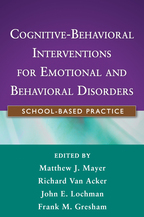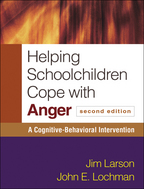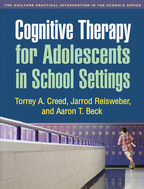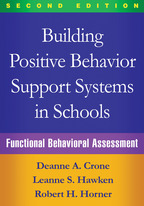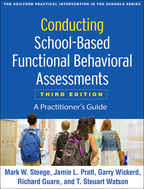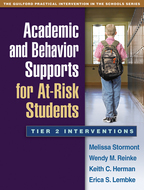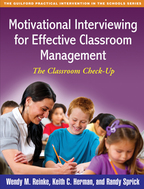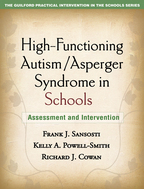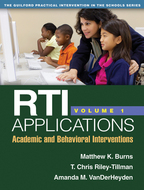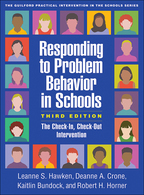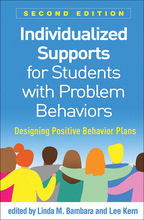Cognitive-Behavioral Interventions for Emotional and Behavioral Disorders
School-Based Practice
Edited by Matthew J. Mayer, Richard Van Acker, John E. Lochman, and Frank M. Gresham
Paperbacke-bookprint + e-book
Paperback
orderMarch 22, 2011
ISBN 9781609184810
Price: $55.00420 Pages
Size: 6" x 9"
Copyright Date: 2009
“The editors are very successful in organizing this book so that it covers assessment, implementation, and evaluation for the range of students who have an emotional and behavioral disorder (EBD) and are entitled to an education in a school setting....A strength of this book is that interventions are looked at within the three-tier model, which includes universal or preventive interventions for students at risk as well as interventions at the secondary tiers....I would highly recommend this book because it combines the effective 'clinical' and school-based interventions. After reading the text and looking at the charts, cited research studies, and bibliography, the school social worker can learn a multitude of ways of working with individuals, groups, classrooms, and parents in a school-based setting.”

—School Social Work Journal
“This practical guide serves as an ideal reference, not only for educators but clinicians and parents, as well as those who are interested in aiding students who suffer from various forms of emotional and behavioral disorders such as aggressive behaviors, anxiety, depression, ADHD, and autism. It addresses theoretical, methodological, and clinical issues on the fundamentals of cognitive-behavioral intervention. There are invaluable chapters exploring the use of various strategies and programs to reach out to at-risk children and adolescents. The forms of interventions proposed range from preventive programs for all levels to specific targeted interventions, thus capturing a broad spectrum of areas of concerns....An indeed welcome guide to schools in general and specifically to institutions with a special education system....It assists schools in improving their practice, to look into the active participation, achievement, and retention of marginalized students in an institution. The lack of existing literature in this area further illuminates the potential usefulness of this guide.”

—Australian Journal of Guidance and Counselling
“This book is a prize for clinicians, researchers, and students alike. The editors have assembled valuable chapters that address theoretical, methodological, and clinical issues. Most impressively, the contributors tackle the often harsh realities that confront clinicians doing cognitive-behavioral therapy in real-world settings. Further, they seamlessly integrate pivotal developmental and ethnocultural variables. I am already clearing space on my bookshelf for this much-needed resource.”

—Robert D. Friedberg, PhD, ABPP, Professor and Director, Center for the Study and Treatment of Anxious Youth, Palo Alto University
“Filling a critical void in the literature, this book illuminates the exciting potential of cognitive-behavioral interventions in school-based practice. The volume is current, comprehensive, and reader friendly. It explores both the theoretical foundations and the many exemplary programs paving the way in schools today. The impressive collection of scholar-authors steers clear of hyperbole in favor of more dispassionate examinations of what the science is saying. Their approach leaves the reader informed, optimistic, and energized.”

—Jim Larson, PhD, Coordinator, School Psychology Program, University of Wisconsin-Whitewater
“Mayer et al. have done all those who work with children and youth with emotional and behavioral disorders a great service by editing a volume about one of our greatest challenges. The book provides better scientific understanding of how young people think about their behavior and how they can be guided to manage their thoughts, feelings, and behaviors more effectively.”

—James M. Kauffman, EdD, Curry School of Education (Emeritus), University of Virginia
—School Social Work Journal
“This practical guide serves as an ideal reference, not only for educators but clinicians and parents, as well as those who are interested in aiding students who suffer from various forms of emotional and behavioral disorders such as aggressive behaviors, anxiety, depression, ADHD, and autism. It addresses theoretical, methodological, and clinical issues on the fundamentals of cognitive-behavioral intervention. There are invaluable chapters exploring the use of various strategies and programs to reach out to at-risk children and adolescents. The forms of interventions proposed range from preventive programs for all levels to specific targeted interventions, thus capturing a broad spectrum of areas of concerns....An indeed welcome guide to schools in general and specifically to institutions with a special education system....It assists schools in improving their practice, to look into the active participation, achievement, and retention of marginalized students in an institution. The lack of existing literature in this area further illuminates the potential usefulness of this guide.”
—Australian Journal of Guidance and Counselling
“This book is a prize for clinicians, researchers, and students alike. The editors have assembled valuable chapters that address theoretical, methodological, and clinical issues. Most impressively, the contributors tackle the often harsh realities that confront clinicians doing cognitive-behavioral therapy in real-world settings. Further, they seamlessly integrate pivotal developmental and ethnocultural variables. I am already clearing space on my bookshelf for this much-needed resource.”
—Robert D. Friedberg, PhD, ABPP, Professor and Director, Center for the Study and Treatment of Anxious Youth, Palo Alto University
“Filling a critical void in the literature, this book illuminates the exciting potential of cognitive-behavioral interventions in school-based practice. The volume is current, comprehensive, and reader friendly. It explores both the theoretical foundations and the many exemplary programs paving the way in schools today. The impressive collection of scholar-authors steers clear of hyperbole in favor of more dispassionate examinations of what the science is saying. Their approach leaves the reader informed, optimistic, and energized.”
—Jim Larson, PhD, Coordinator, School Psychology Program, University of Wisconsin-Whitewater
“Mayer et al. have done all those who work with children and youth with emotional and behavioral disorders a great service by editing a volume about one of our greatest challenges. The book provides better scientific understanding of how young people think about their behavior and how they can be guided to manage their thoughts, feelings, and behaviors more effectively.”
—James M. Kauffman, EdD, Curry School of Education (Emeritus), University of Virginia

